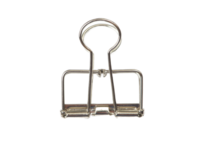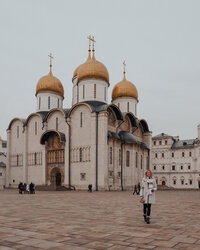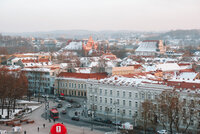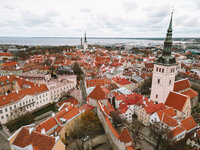

A Complete Guide to the Russian Genitive Case (+ A Quiz!)
Today’s guide will teach you all about the Russian genitive case! If you’ve never heard of the genitive case, first read my guide on the Russian Case System to get a better overview. The genitive case, in Russian known as родительный падеж, is used in various situations such as to indicate possession, negation, important dates, and more.
Before we get into the knitty gritty of the genitive case, here is a basic example of how the genitive case is formed. So, let’s take a basic sentence in which the word “маши́на” is used in the nominative case: У меня́ есть маши́на. This means “I have a car.” If you want to say you don’t have a car, this is negation so you need to put “car” into the genitive case. If you look at the endings chart below, you’ll see that feminine nouns that end in “а” change to “ы or и” depending on the preceeding consonant. You can see that modification in the following example in which the genitive case applies: У меня́ нет маши́ны.
Last updated: 1/6/2024
So, that’s one example of the genitive case. Now, let’s learn how to form the genitive case, when to use it, and then test your understanding with a quiz at the end!
For information on other Russian cases, check out my guides: Accusative, Prepositional, Dative
Давайте начнём!
Contents
The Russian Genitive Case

How to Form the Russian Genitive Case
Adjective and Noun Endings
| Gender | Singular | Plural | ||
|---|---|---|---|---|
| Adj. | Noun | Adj. | Noun | |
| Masculine | ого / его | cons. → cons. + а й → я ь → я |
ых / их | cons. → cons. + ов й → ев ь → ей |
| Feminine | ой / ей | а → ы я → и ь → и |
а → drop я → ь ия → ий ь → ей |
|
| Neuter | ого / его | о → а е → я мя → мени |
о → drop е → ей ие → ий мя → ён |
|
Personal Pronouns
| Nominative | Genitive |
|---|---|
| я | меня |
| ты | тебя |
| он | (н)его |
| она | (н)её |
| мы | нас |
| вы | вас |
| они | (н)их |
Possessive Pronouns
| Masculine, Neuter | Feminine | Plural |
|---|---|---|
| мой, моё → моего | моя → моей | мои → моих |
| твой, твоё → твоего | твоя → твоей | твои → твоих |
| наш, наше → нашего | наша → нашей | наши → наших |
| ваш, ваше → вашего | ваша → вашей | ваши → ваших |
| её, его, их do not change | ||




When to Use the Russian Genitive Case
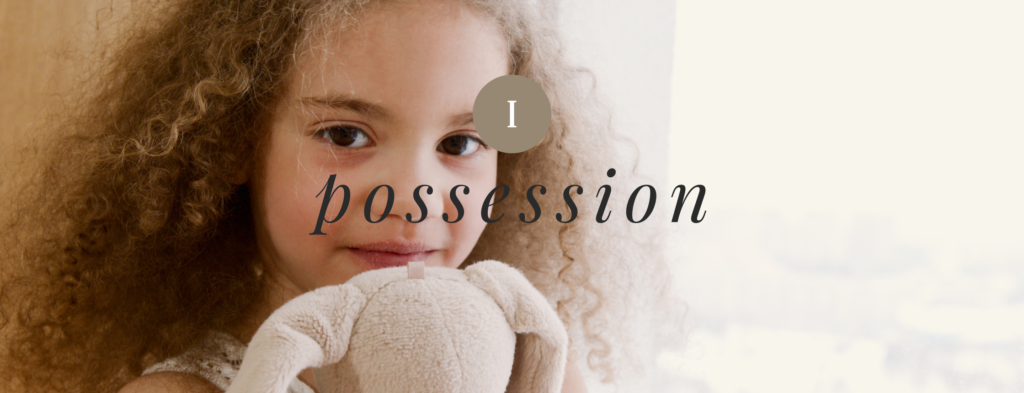

1. To Indicate Possession
У кого́ (есть)? – Who has?
- У неё гора́здо бо́льше де́нег, чем у меня́. – She has a lot more money than I do.
- У мое́й ма́тери есть води́тельские права́, но она́ не во́дит маши́ну. – My mother has her driver’s license, but she doesn’t drive.
- У Светла́ны сего́дня хоро́шее настрое́ние. – Svetlana is in a good mood today.
Че́й / Чья́ / Чьё / Чьи́ – Whose?
- Это ручка Све́ты. – This is Sveta’s pen.
- Она́ не моя́ соба́ка, а соба́ка сестры. – She’s not my dog, she’s my sister’s dog.
- – Чьи э́ти кни́ги? – Джо́на. – Whose books are these? – John’s.


2. To Negate / Show the Absence of something or someone
Кого́/Чего́ нет (не́ было / не бу́дет)? – Who/What isn’t?
- Еды́ нет, воды́ нет. – There’s no food, no water.
- Кого́ у нас нет?– Who isn’t here (at the location where we are)?
- У Ка́ти не́ было никаки́х причи́н не ве́рить Владисла́ва. – Katya didn’t have any reason not to believe Vladislav.
- Ты бу́дешь забо́титься о мое́й соба́ке, пока́ меня́ не бу́дет? – Will you take care of my dog while I am away?


3. Important Dates and Years
Когда́? – When?
- Я родила́сь восьмо́го ма́я ты́сяча девятьсо́т девяно́сто пя́того го́да. – I was born on May 8th 1995.
- Двена́дцатого апре́ля ты́сяча девятьсо́т шестьдеся́т пе́рвого го́да Ю. А Гага́рин полете́л в ко́смос. – Yuri Gagarin flew into space April 20th 1961.
- Но́вый уче́бный год в Росси́и начина́ется пе́рвого сентября́. – The new academic year in Russia begins on the 1st of September.


4. To Show the Relationship between Parts of a Whole
Just remember this as the “of” rule – If you need to say “of” something indicating it is part of a greater or bigger whole, use the genitive case!
Чего́? – Of what?
- Соединённые Шта́ты Аме́рики — страна́ иммигра́нтов. – The United States of America is a country of immigrants.
- Горы в э́той части страны полны́ разнообразия. – The mountains in this part of the country are full of variety.
- Мой оте́ц вернётся в нача́ле сле́дующего ме́сяца. – My father will return at the beginning of next month.
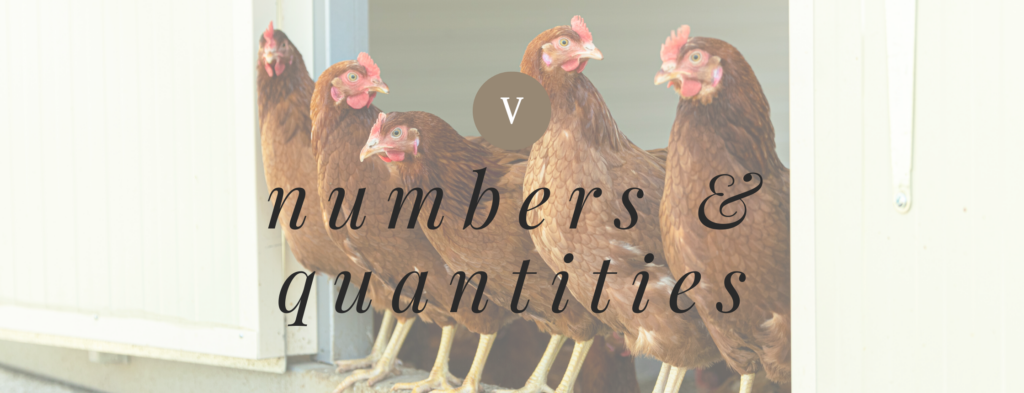

5. Numbers + Quantitative Descriptions
2, 3, 4 + чего́ / кого́ – 2, 3, 4 + what / who?
Counting note (2, 3, 4, + adj. + noun):
(f.) две́, три, четы́ре + nominative plural + genitive singular
(m., n.) два́, три, четы́ре + genitive plural + genitive singular
- У меня два бра́та и две сестры́. – I have two brothers and two sisters.
- Сегодня я уже выпила две ча́шки ча́я. – I’ve already drunk two cups of tea today.
- В ко́мнате стоя́ли две небольши́е ту́мбочки. – In the room there were two small side tables.
- В мое́й семье́ четыре челове́ка. – There are four people in my family.
5+ + чего́ / кого́ (pl.) – 5+ + what / who?
Counting note (5+ + adj. + noun):
(f., m., n.) + genitive plural + genitive plural
- В дворе бегали пять маленьких детей. – In the courtyard five little children were running around.
- У кошки девять жи́зней. – Cats have nine lives.
- У э́той стару́шки семь злых соба́к. – This old lady has seven evil dogs.
Ско́лько + чего́ / кого́? (pl.) – How much/many + what / who?
Не́сколько + чего́ / кого́ (pl.) – Several + what / who?
Ма́ло + чего́ / кого́ (pl.) – Few + what / who?
Мно́го / Нема́ло + чего́ / кого́ (pl.) – Many + what / who?
Достаточно+ чего́ / кого́ (pl.) – Enough + what / who?
Дво́е / Тро́е / Че́тверо / Пя́теро … + чего́ / кого́ (pl.) – Many + what / who?
- Ско́лько у тебя бли́зких друзе́й? – How many close friends do you have?
- Ско́лько лет, ско́лько зим! – It’s been so long! (lit. How many years, how many winters!)
- У него́ дво́е дете́й. – He has two kids.
Note: Some nouns are only used in the SINGULAR genitive
Uncountable nouns: вода́ (ex. мно́го воды́), еда́ (ма́ло еды́), молоко́ (немно́го молока́)
Collective nouns: ме́бель (нема́ло ме́бели), оде́жда (мно́го ра́зной оде́жды), о́бувь (мно́го о́буви)
Abstract nouns: свобо́да (мно́го свобо́ды), любо́вь (доста́точно любви́), не́нависть (сто́лько не́нависти)
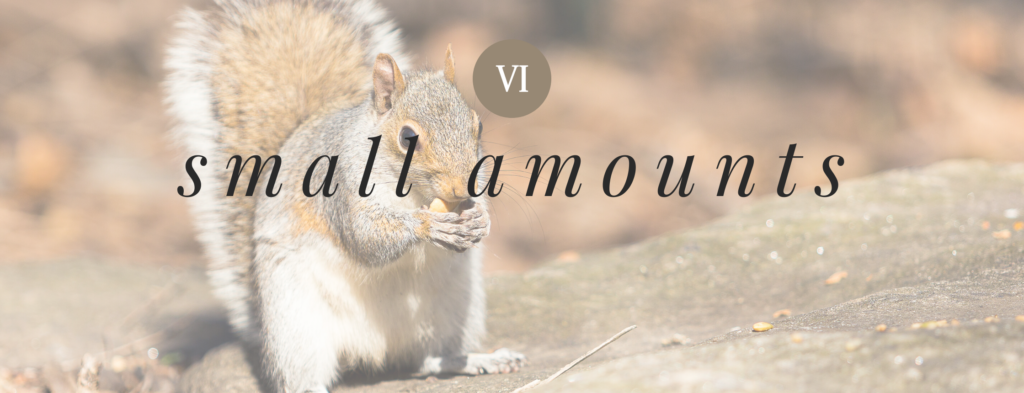

6. To Indicate a Small Amount of Something
If you want to talk about just a little bit of something, we use what’s called the “partitive genitive.” Normally, we use the accusative case to indicate direct objects, however, because we just want to say we mean a small amount, or part, of it, we use the genitive case. It is used when talking about eating or drinking.
And just in case the genitive case isn’t tricky enough, there are a few nouns that have special partitive genetive case endings! See below for the exceptions.
Чего́? – What?
- Она́ съе́ла хле́ба. – She ate some bread.
- Иван заказа́л шампа́нского. – Ivan ordered some champagne.
- Вы́пей воды. – Drink some water.
| Noun | Genitive Singular | Genitive Partitive |
|---|---|---|
| чай | чая | чаю |
| суп | супа | супу |
| сахар | сахара | сахару |
| сыр | сыра | сыру |
| шоколад | шоколада | шоколаду |


7. With Certain Prepositions
У – At what/whose place
- У сосе́дей шу́мно. – It’s noisy at my neighbor’s.
О́коло – Near, by
- Серге́й встре́тил Аню в кафе́ около ста́нции. – Sergei met Anya at a cafe near the station.
От – From, of
- From (distance)
- From (range)
- From (a person)
- From (part of a whole unit)
- From (cause)
- Against (symptoms/illnesses)
- Я́блоко от я́блони недалеко́ па́дает. – The apple doesn’t fall far from the tree.
- Школа находится недалеко́ от дома Павла. – The schol is located not far from Pavel’s house.
- Как далеко́ от твое́й кварти́ры до па́рка? – How far is it from your apartment to the park?
- Биле́ты на матч ту́льского “Арсена́ла” с “Те́реком” сто́ят от 200 (двухсо́т) до 550 рубле́й. – Tickets to the match Tula “Arsenal” with “Terek” cost from 200 to 550 rubles.
- Это пода́рок от ма́мы. – It’s a gift from my mom.
- Я на седьмо́м не́бе от сча́стья. – The TV remote is under the couch.
- Пульт от телеви́зора под дива́ном. – The TV remote is under the couch.
- Наде́юсь, учёные скоро оты́щут лекарство от СПИДа. – I hope that some scientist will soon discover a cure for AIDS.
С(о) – From, since
- From (locations using на in prepositional case)
- From (removal)
- Since (time)
- Виктор с ума́ сошёл? – Has Victor gone crazy?
- Она́ взяла́ с по́лки кни́гу. – He took a book from the bookshelf.
- Я с ним не говори́л с тех пор. – I haven’t spoken with him since.
- Я учи́лась в университе́те с ты́сяча девятьсо́т девяно́сто пя́того по ты́сяча девятьсо́т девяно́сто девя́тый год. – I studied at university from 1995 to 1999.
Из – From, out of
- From
- From (out of)
- Я встре́тил де́вушку из Аме́рики. – I met a girl from America.
- Стол сде́лан из де́рева. – The desk is made of wood.
До – To, up to, until, before
- To (direction)
- To (distance)
- Up to (limit)
- Until
- Before
- За како́е вре́мя авто́бус добира́ется до аэропо́рта? – How long does the bus take to get to the airport.
- От Москвы́ до Санкт-Петербурга 635 километров. – It’s 635 kilometers from Moscow to Saint Petersburg.
- Я буду тут до девяти. – I’ll be here until 9.
- Встре́чу отложи́ли до сле́дующей среды́. – The meeting was put off until next Wednesday.
- Они вы́шли до того́, как мы пришли́. – They left before we arrived.
По́сле – After
- По́сле э́того он пошёл домо́й. – After that, he went home.
Из-за – Because of, from
- Because of (cause)
- From (location)
- Самолёт опозда́л из-за плохо́й пого́ды. – Due to bad weather, the plane was late.
- Людмила вста́ла из-за стола́. – Liudmila got up from the table.
Из-под – From, from under, out of
- From under (location)
- Out of
- Вылеза́й из-под стола́! – Come out from under the table!
- Большинство́ народов пьют во́ду из-под кра́на. – The majority of people drink water from the tap.
- Ситуа́ция вы́шла из-под контроля́. – The situation got out of control.
Вокру́г – Around
- Я постро́ю забо́р вокруг своего́ до́ма. – I’ll build a fence around my house.
Ми́мо – Past
- Пройди́те мимо це́ркви и поверни́те направо. – Walk past the church and turn right.
Вдоль – Along, alongside
- Иди́ вдоль реки́ и ты найдёшь магази́н. – Walk along the river and you will find the store.
Позади́ – Behind
- Она́ шла позади́ всех. – She was walking behind everyone.
Посреди́ – In the middle
- Соба́ка мои́х соседей ла́ет посреди́ но́чи. – My neighbor’s dog barks in the middle of the night.
Напро́тив – Opposite, in front of
- Я купи́ла э́ту кни́гу в кни́жном напро́тив вокза́ла. – I bought this book at the bookstore in front of the station.
Про́тив – Against
- Все студе́нты бы́ли про́тив войны́. – All the students were against the war.
Кро́ме – Except, besides
- Я не могу́ вини́ть никого́, кро́ме себя́. – I can’t blame anyone except myself.
Без – Without
- Without
- Until (time)
- Без сомне́ний. – There’s no doubt.
- Без тебя́ моя́ жизнь была́ бы бессмы́сленна. – My life would be meaningless without you.
- Сейча́с без десяти́ де́вять. – It’s ten to nine. (literally: It’s nine without ten)
Для – For
- Для меня́ нет ничего́ важне́е семьи́. – For me there’s nothing more important than family.
Ра́ди – For the sake of
- Ра́ди бо́га! – For God’s sake!
Ввиду́ – In light of, owing to
- Ввиду плохо́й пого́ды Влад не пошёл. – Owing to bad weather, Vlad didn’t go.
Всле́дствие – As a result of, on account of
- Самолёт был заде́ржан на два часа́ всле́дствие плохо́й пого́ды. – The plane was delayed for two hours on account of the bad weather.
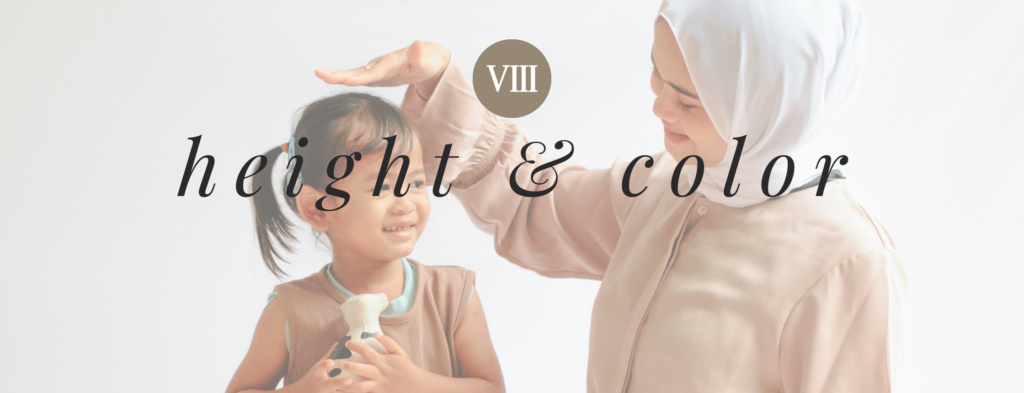

8. To Describe Color and Height
Како́го цве́та?
- Моя́ маши́на кра́сного цве́та. – My car is red.
Како́го ро́ста?
- Она приме́рно твоего́ ро́ста. – She’s roughly your height.
- Так же, как и я, он невысо́кого ро́ста. – Like me, he’s not tall.


9. With Certain Verbs + Adjectives
VERBS
боя́ться – to be afraid (of)
- Я бою́сь пауко́в. – I’m afraid of spiders.
жела́ть / пожела́ть – to wish, desire
- Жела́ю вам вся́ческого сча́стья. – I wish you every happiness.
достига́ть / дости́гнуть / дости́чь – to reach, attain
- Кири́лл упо́рно труди́лся, что́бы дости́чь це́ли. – Kirill worked hard to achieve (his) goal.
добива́ться / доби́ться – to achieve
- Она полна́ реши́мости доби́ться успе́ха на э́тот раз.– She is determined to succeed this time.
заслу́живать / заслужи́ть – to deserve, be deserving (of)
- Они́ заслу́живают того́, чтобы узна́ть пра́вду. – They deserve to know the truth.
хвата́ть / хвати́ть – to have enough (of)
- Ему́ не хвата́ет вре́мени. – He doesn’t have enough time.
лиша́ть / лиши́ть – to deprive (of)
- Его лиши́ли гражда́нских прав. – He was deprived of his civil rights.
лиша́ться / лиши́ться – to lose
- Рабо́чие лиши́лись рабо́ты. – Workers lost their jobs.
избега́ть / избежа́ть – to escape, avoid
- Солда́ты едва́ избежа́ли сме́рти. – The soldiers narrowly escaped death.
каса́ться / косну́ться – to touch, concern
- Э́то тебя́ не каса́ется. – This doesn’t concern you.
приде́рживаться / придержа́ться – to adhere to, hold oneself to
- Он приде́рживается свои́х при́нципов. – He sticks to his principles.
тре́бовать / потре́бовать – to demand, require
- Изуче́ние ру́сского языка́ тре́бует терпе́ния. – Learning the Russian language requires patience.
ADJECTIVES
по́лный – по́лон, полна́, полно́, полны́ – full (of)
- Буты́лка полна́ воды. – The bottle is filled with water.
лишённый – лишён, лишена́, лишено́, лишены́ – devoid, deprived (of), lacking
- Илья лишён здра́вого смы́сла. – Ilya lacks common sense.
досто́йный – досто́ин, досто́ина, досто́ино, досто́ины – worthy
- Я не досто́йна твое́й любви́. – I’m not worthy of your love.


10. Comparisons
Russian comparisons are pretty straightforward, and you’re presented with two options after you use them: чем (than) + noun OR noun in the genitive case. See below for some examples of comparisons in Russian and a list of common comparisons.
Comparison + чего́ / кого́?
- Она ста́рше меня на три го́да, но ни́же меня ро́стом. – She is older than me by three years, but shorter than me.
- бо́лее (more) ≠ ме́нее (less)
- лу́чшее (better) ≠ ху́же (worse)
- бо́льше (bigger) ≠ ме́ньше (smaller)
- доро́же (more expensive) ≠ деше́вле (cheaper)
- моло́же (younger) ≠ста́рше (older)
- вы́ше (taller, higher) ≠ни́же (shorter, lower)




Practice the Russian Genitive Case!


Questions?
Comment below with any questions you have or write your own examples using the genitive case! If you need some more help, check out the links below for some more examples.
- A Beginner-Friendly Guide To The Russian Genitive Case by StoryLearning
- A Genius Approach to the Russian Genitive Case (An introduction) by Live Fluent
Learn to speak russian
Travel with ease & dive into the culture, history & lifestyle of post-Soviet countries
free russian learning materials
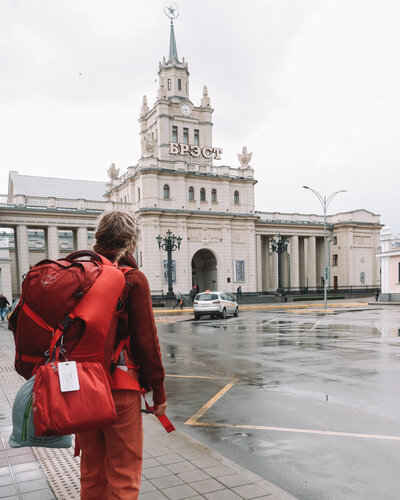
Melissa
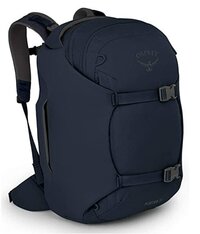
Get the Goods
Head over to the Language & Travel Shop to check out my favorite goodies I use for learning Russian and traveling! I've compiled all my favorite products I use when #onthebloc so that you can benefit from them when you travel abroad. Help yourself prepare and support this blog at the same time :) Счастливого пути!
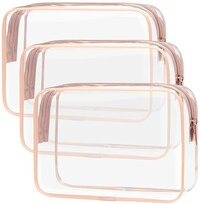



carry-on goods
gifts for travelers
photography
apparel & accessories
textbooks & readers
luggage & bags
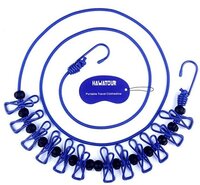
categories
#oTB essentials
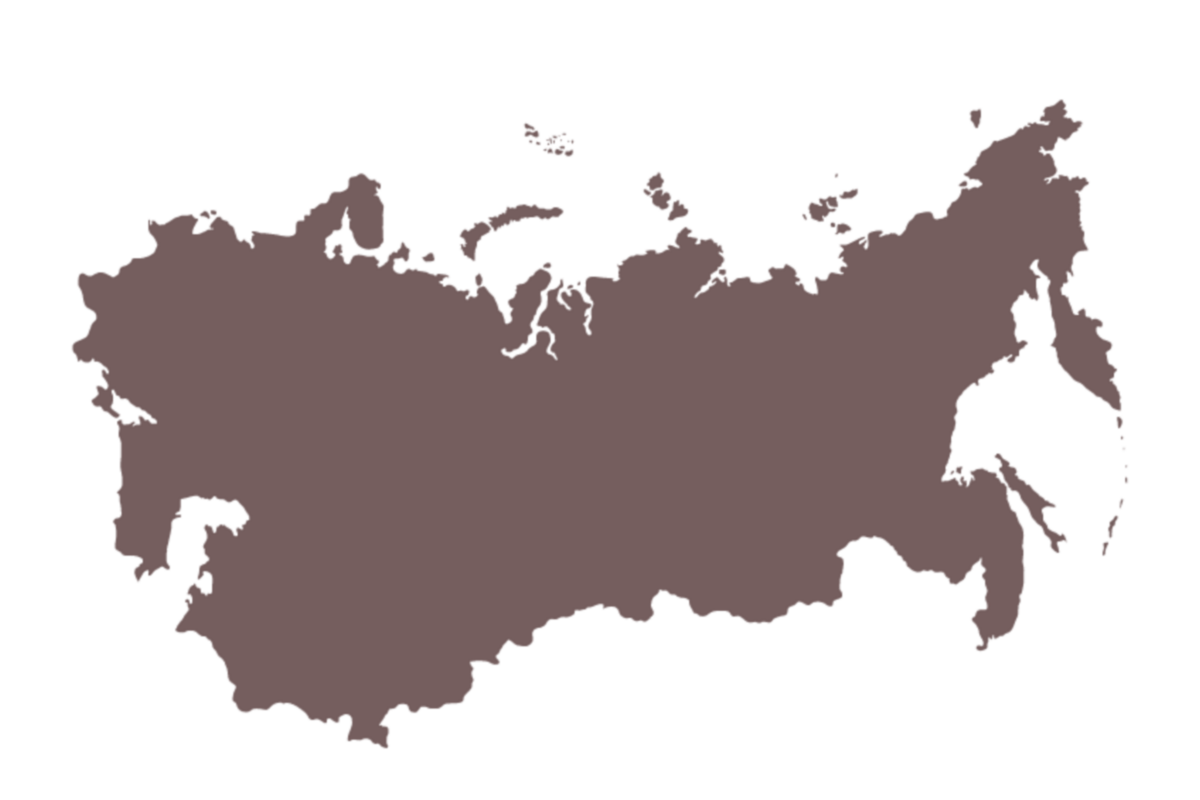
Russian-Speaking Travel Destinations
use your new russian skills in real life!
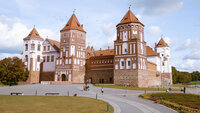
Belarus
EASTERN EUROPE
central Asia
central Asia


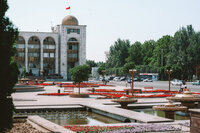


Eurasia
Russia
Kyrgyzstan
armenia
Moldova
Kazakhstan
eastern europe
read »
read »
read »
read »
read »
read »
The caucasus
travel guides
Get your FREE #OnTheBloc Starter Kit!
Sign up for the NGB Monthly Newsletter & you'll get a FREE downloadable PDF with Russian language and travel resources for your post-Soviet journey!
оставаться на связи

